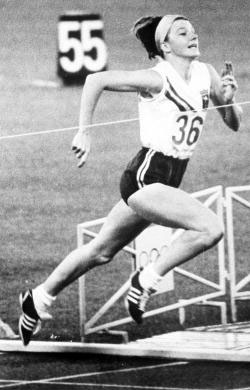
Maureen Caird was born in Cumberland, NSW and began serious athletics as a teenager. And coached by 1948 Olympian June Ferguson, success came early – a surprise Olympic victory in 1968 at just 17 years of age.
Maureen was an amazing junior – initially winning primary school titles, before as a tender 13 year old, gathering senior and junior schoolgirl championships over 100 yards.
Progress was rapid and within a year, Maureen ran 11.0 for 80 metres hurdles to smash the Australian junior record. In 1967 she lowered the mark dramatically – to 10.6.
At that year’s women’s National Championships on North Hobart Oval, she ran a wind-assisted 10.5 to win her heat and in the final she finished a creditable third behind Pam Kilborn in 11.0. Compensation for any disappointment came in the form of the junior title in 11.1 and a second gold in the pentathlon.
A year later the championships were in Adelaide and Maureen edged closer, this time finishing a close second to Pam in both the then standard event, 10.5 to 10.6 and again in the new 100 metres hurdles 13.4 to 13.8. She again won the junior hurdles in 10.6 and added the long jump title with a best leap of 5.64m.
But the 80m hurdles result carried an extra prize in the form of selection for the Mexico Olympics to be held in October. Despite Maureen’s youth and lack of international experience, coach Ferguson expected her charge to win a medal but unlike nowadays personal coaches rarely travelled with their athletes and June was not there to see the story unfold.
At a pre-Games meet in Mexico Maureen lowered her personal best to 10.5.
At 17 she faced her biggest challenge but perhaps fortunately her major rival and one of the favorites for gold was team-mate and by then regular adversary, Pam Kilborn. Pam won her heat in 10.41 seconds, whilst Maureen stunned everyone, presumably bar her coach, by winning hers in 10.48. They were the two fastest times of all the heats.
The pattern continued with both Australians winning their semis, Pam in 10.44 and Maureen in 10.59 although the latter victory was into a strong headwind. The two were evenly matched but as always in the past, Pam was slightly the superior.
June conveyed her race plan to her girl for the final – “reach the first hurdle in front, and you won’t be headed”. The coach proved to be correct for that was exactly what eventuated, Maureen did winning in 10.39 to Pam’s 10.46 in second place.
Maureen remains the youngest sprint hurdles gold medallist in Olympic history.
It was back to the past when the team returned home with Maureen finishing second to Pam in the 1969 women’s Nationals in Brisbane on Lang Park’s grass in 10.8. She slipped to fourth in the 100 metres hurdles in 13.5 but retained her junior title in a windy 10.6. In December athlete and coach split and Maureen began working with John Pryke.
The following season, at the 1970 women’s Nationals at Royal Park, Melbourne, Maureen finally won her first national senior titles beating Pam over the 100 metres hurdles in which both clocked 13.3 and the 200 metres hurdles 26.3 to 26.5. She also finished fourth in the 100 metres in 12.1 .
Not surprisingly, Maureen was selected for the 1970 Commonwealth Games in Edinburgh along with Pam and Penny McCallum, to run the 100 metres hurdles, now recognized as the standard international distance for women’s hurdles. At the Games, they were also controversially entered in the pentathlon to get an extra hurdles run, each of them withdrawing after doing just the hurdles and shot put.
In the main event, all three qualified through the two heats, Maureen running 13.79 whilst Pam was the fastest in 13.48. In the final Pam ran away with the race in 13.27 with Maureen taking silver in 13.73, reversing the result from Mexico two years before. Australia narrowly missed a clean sweep with Penny finishing fourth in 13.82 .
At the 1971 women’s Nationals in Sydney, although Pam was absent, Maureen managed only third in the 100m hurdles in 13.8 behind Di Pease and Gaye Dell who both recorded 13.7. However she took gold in the 200 metres hurdles narrowly from Di with both clocking 27.0.
The 1972 Nationals in Perth were also the selection trials for the Olympic Games in Munich. Penny McCallum (now Gillies) won the title in 13.3 from the now also married Pam Ryan who ran the same time, whilst Maureen was third in 13.6. All three were selected.
But as it would eventuate a short but stunning career was drawing to a close. Maureen changed her start style before the Games and there were reports she was having stomach problems. The magic of Mexico was not there for the defending champion as she finished only fifth in her heat in 13.63 and was eliminated. Better news came when she ran the opening leg of the 4×100 metres relay team which finished a fine sixth in the final in a quick 43.61.
But then it all came to a close. Maureen who had recently married announced her retirement from athletics – at 21.
Paul Jenes
AA Statistiacian
President ATFS
Acknowledgements: Harry Gordon – “Australia and the Olympic Games”; Graham Thomas; Paul Jenes – “Fields of Green, Lanes of Gold”; Paul Jenes & Peter Hamilton – “Australian Athletic Results”

